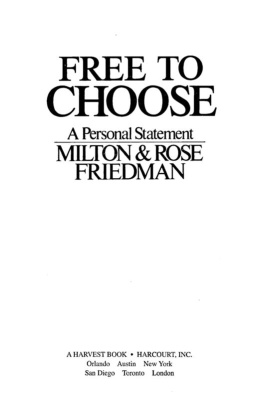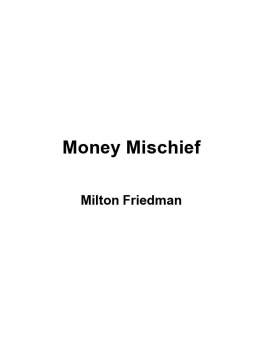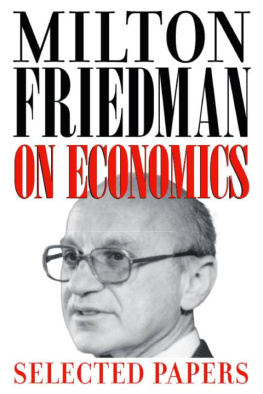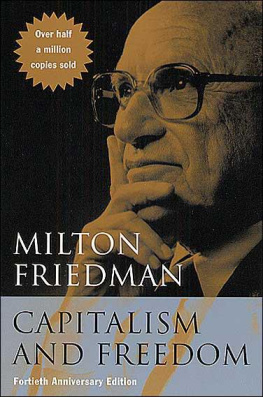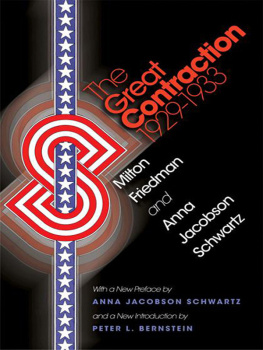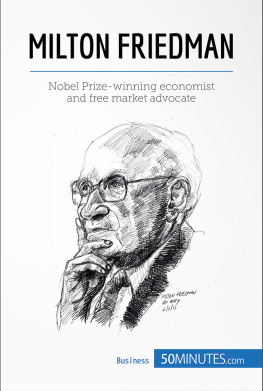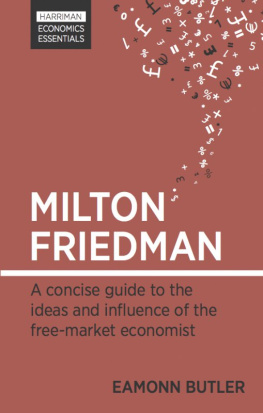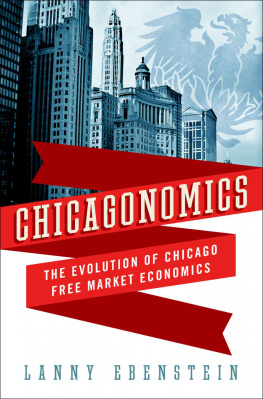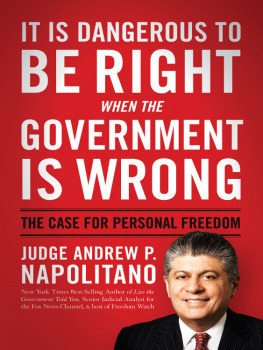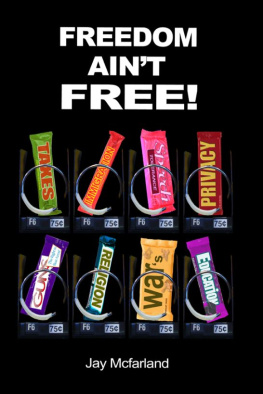Milton Friedman - Free to Choose: A Personal Statement
Here you can read online Milton Friedman - Free to Choose: A Personal Statement full text of the book (entire story) in english for free. Download pdf and epub, get meaning, cover and reviews about this ebook. year: 1990, publisher: Mariner Books, genre: Politics. Description of the work, (preface) as well as reviews are available. Best literature library LitArk.com created for fans of good reading and offers a wide selection of genres:
Romance novel
Science fiction
Adventure
Detective
Science
History
Home and family
Prose
Art
Politics
Computer
Non-fiction
Religion
Business
Children
Humor
Choose a favorite category and find really read worthwhile books. Enjoy immersion in the world of imagination, feel the emotions of the characters or learn something new for yourself, make an fascinating discovery.
- Book:Free to Choose: A Personal Statement
- Author:
- Publisher:Mariner Books
- Genre:
- Year:1990
- Rating:4 / 5
- Favourites:Add to favourites
- Your mark:
- 80
- 1
- 2
- 3
- 4
- 5
Free to Choose: A Personal Statement: summary, description and annotation
We offer to read an annotation, description, summary or preface (depends on what the author of the book "Free to Choose: A Personal Statement" wrote himself). If you haven't found the necessary information about the book — write in the comments, we will try to find it.
Free to Choose: A Personal Statement — read online for free the complete book (whole text) full work
Below is the text of the book, divided by pages. System saving the place of the last page read, allows you to conveniently read the book "Free to Choose: A Personal Statement" online for free, without having to search again every time where you left off. Put a bookmark, and you can go to the page where you finished reading at any time.
Font size:
Interval:
Bookmark:
A HARVEST BOOK HARCOURT, INC.
Orlando Austin New York
San Diego Toronto London
Copyright 1980 by Milton Friedman and Rose D. Friedman
Copyright 1979 by Milton Friedman
Forward copyright 1990 by Milton Friedman and Rose D. Friedman
All rights reserved. No part of this publication may be reproduced or
transmitted in any form or by any means, electronic or mechanical,
including photocopy, recording, or any information storage and
retrieval system, without permission in writing from the publisher.
Requests for permission to make copies of any part of the work should be
submitted online at www.harcourt.com/contact or mailed to the
following address: Permissions Department, Harcourt, Inc.,
6277 Sea Harbor Drive, Orlando, Florida 32887-6777.
www.HarcourtBooks.com
The authors wish to thank the following publishers
for permission to quote from the sources listed:
Harvard Educational Review. Excerpts from "Alternative Public School
Systems" by Kenneth B. Clark in the Harvard Educational Review,
Winter 1968. Reprinted by permission of the publisher.
Newsweek magazine. Excerpt from " Barking Cats" by Milton Friedman
in Newsweek magazine, February 19, 1973. Copyright 1973 by
Newsweek, Inc. All rights reserved. Reprinted by permission.
The Wall Street Journal. Excerpts from "The Swedish Tax Revolt" by
Melvyn B. Krauss in The Wall Street Journal, February 1, 1979.
Reprinted by permission of The Wall Street Journal,
Dow Jones & Co., Inc., 1979. All rights reserved.
Library of Congress Cataloging-in-Publication Data
Friedman, Milton, 1912
Free to choose: a personal statement/Milton & Rose Friedman,
p. cm.
Includes bibliographical references and index.
ISBN 978-0-15-633460-0 (pbk.)
1. Capitalism. 2. Welfare state. 3. Industry and state.
I. Friedman, Rose D. II. Title.
[HB501.F72 1990] 330.12'2-dc20 90-36179
Printed in the United States of America
First Harvest edition 1990
BB CC AA
To Ricky and Patri
FOREWORD TO THE HARVEST EDITION
PREFACE
INTRODUCTION
CHAPTER 1 The Power of the Market
CHAPTER 2 The Tyranny of Controls
CHAPTER 3 The Anatomy of Crisis
CHAPTER 4 Cradle to Grave
CHAPTER 5 Created Equal
CHAPTER 6 What's Wrong with Our Schools?
CHAPTER 7 Who Protects the Consumer?
CHAPTER 8 Who Protects the Worker?
CHAPTER 9 The Cure for Inflation
CHAPTER 10 The Tide Is Turning
APPENDICES
NOTES
INDEX
When Free to Choose was first published a decade ago, we were sufficiently optimistic to label our final chapter "The Tide Is Turning." The climate of opinion was, we thought, shifting away from a belief in collectivism and toward a belief in individualism and private markets. We did not dream that the tide would turn as dramatically as it hason both sides of the Iron Curtain.
Ten years ago, many people around the world believed that socialism was a viable, even the most promising, system for promoting material prosperity and human freedom. Few people anywhere in the world believe that today. Idealistic faith in socialism still lives on, but only in some ivory tower enclaves in the West and in some of the most backward countries elsewhere. Ten years ago, many people were convinced that capitalism, based on free private markets, was a deeply flawed system that was not capable of achieving both widely shared prosperity and human freedom. Today conventional wisdom regards capitalism as the only system that can do so.
Is Free to Choose outdated and no longer needed now that its main thesis has become conventional wisdom? Far from it. Conventional wisdom may have changed, but conventional practice has not. Political leaders in capitalist countries who cheer the collapse of socialism in other countries continue to favor socialist solutions in their own. They know the words, but they have not learned the tune.
Despite the drastic change in intellectual and popular opinion in the past decade, governments of so-called capitalist countries are just as backward as governments of communist countries in dismantling the socialist practices that have mushroomed in recent decades. The fraction of our income that goes to finance government spendingsupposedly on our behalfhas not declined appreciably and in many countries has continued to increase. In the United States, it was 40 percent in 1980 and 42 percent in 1988, down from a high of 44 percent in 1986. Neither has there been much letup in the flood of detailed regulations that control our lives: in 1980, 87,012 pages were added to the Federal Register, which records all regulations; in 1988, 53,376 pages. In the words of the Declaration of Independence, our governments continue to erect "a multitude of new offices" and send "swarms of officers to harass our people and eat out our substance."
Restraints on international trade, analyzed in Chapter 2 of Free to Choose, have grown, not declined; some restrictions on prices and wages, particularly exchange controls, have been eliminated or reduced, but others have been added. Our cradle^to-grave Social Security system has become more extensive and is in greater need of reform than ever (Chapter 4); that is equally true of our school system (Chapter 6). The institutions set up to "protect the consumer" and "the worker" continue to have effects opposite to those intended by their well-meaning sponsors (Chapters 7 and 8). In these and other areas, the momentum of past practices has overwhelmed the effect of a changed climate of opinion.
There has been a substantial improvement in the rate of inflation, which has declined worldwidein the U.S., from well over 10 percent a year to less than 5 percent. However, inflation is by no means conquered, and our analysis of the causes, consequences, and cure of inflation in Chapter 9 remains valid and highly relevant to assure that recent reductions in inflation are more than a flash in the pan.
The big change has been not in achievements but in prospects. Free private markets are far more likely to multiply in coming years than seemed possible ten years ago. As a result, a book that explains how free private markets work, what their advantages are, and how to eliminate obstacles to their more effective operation has even greater relevance today than it had ten years ago.
Some specific figures and references in our book are now out of date, but we have thought it best to reprint the manuscript essentially unchanged. A thorough revision of the book to bring it up to date and to include the new problems that have arisen in the interim might well be worthwhile, but we have not been in a position to undertake the task and concluded that it was better to leave the manuscript alone than to do a superficial update. We hope that the occasional anachronism will not interfere with the reader's understanding.
What appeared to many readers of the book ten years ago as Utopian and unrealistic will, we believe, appear to many new readers as almost a blueprint for practical change. We are therefore delighted that Harcourt Brace Jovanovich is issuing a new edition of Free to Choose. The tide has turned, but it is still far from the flood tide that is so badly needed to assure a bright future for human freedom.
Milton and Rose Friedman
January 4, 1990
This book has two parents: Capitalism and Freedom, our earlier book, published in 1962 (University of Chicago Press); and a TV series, titled, like the book, "Free to Choose." The series will be shown on the Public Broadcasting Service for ten successive weeks in 1980.
Capitalism and Freedom
Next pageFont size:
Interval:
Bookmark:
Similar books «Free to Choose: A Personal Statement»
Look at similar books to Free to Choose: A Personal Statement. We have selected literature similar in name and meaning in the hope of providing readers with more options to find new, interesting, not yet read works.
Discussion, reviews of the book Free to Choose: A Personal Statement and just readers' own opinions. Leave your comments, write what you think about the work, its meaning or the main characters. Specify what exactly you liked and what you didn't like, and why you think so.

